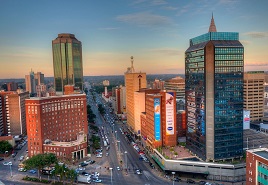By Rungano Dzikira
In a move meant to revive exports, increase foreign direct investment, create jobs, and facilitate overall economic development, Government has gazetted incentives for Special Economic Zones.
Fiscal incentives gazetted include zero rated corporate income tax exemption for the first five years of operation and a corporate tax rate of 15 percent thereafter; duty free importation of capital equipment; special initial allowance of 50% of cost from year one and 25% in the subsequent two years; and exemptions for non-residents withholding tax on fees on services that are not locally available.
SEZ Chief Executive, Edwin Kondo said that soon the Authority would begin approving projects that were on hold.
“Government is moving with times in accelerating the implementation of this important investment programme capable of increasing exports, creating employment, as well as transferring technology and managerial skills.
“For now, focus is on the initially designated pilot zones; Sunway City in Harare, which will be responsible for being the high technology hub; Bulawayo, as the industrial hub, focusing on manufacturing value chains, Victoria Falls Tourism Hub, covering financial services and tourism; and Mutare, focusing on diamond polishing,” he said.
Other non-fiscal incentives yet to be gazetted include ownership of companies within SEZs up to 100%, issuance of work permits within 72 hours for 10 years, issuance of residence permit after 5 years, citizenship for any person who invests more than US$500 000, investors in the SEZ to be issued with Preliminary Development Permits within five days to allow resource mobilisation while finalising the EIA study.
Monetary incentives include capital and profit repatriation of up to 100%, investors allowed to borrow offshore without RBZ approval, 100% subscription on primary bond issue subscription.
Zimbabwe’s SEZ are being established to restore the economy’s capacity to produce goods and services competitively; to create economies of scale good enough for the locator of the proposed SEZs to be internationally competitive, and to ensure inclusive growth emanating from the spread of growth nodes and diversified provincial offerings.




